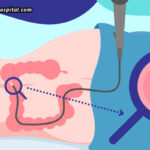Colorectal cancer ranks among the most prevalent and lethal types of cancer, yet it is also highly preventable. Central to this prevention approach is a vital screening method – colonoscopy. More than merely a diagnostic tool, colonoscopy actively contributes to the prevention of colorectal cancer by detecting and excising precancerous polyps before they have the opportunity to develop further. This blog delves into the preventive capabilities of colonoscopy and its role as one of the most effective methods for alleviating the impact of colorectal cancer within various populations.
Colorectal cancer begins with polyps
To understand how colonoscopy helps prevent colorectal cancer, it is essential to first understand how the cancer develops. Most colorectal cancers originate from small, non-cancerous growths known as polyps that appear on the inner lining of the colon or rectum. While many polyps are benign, certain types, especially adenomatous polyps and serrated polyps, have the potential to become cancerous over a span of 10 to 15 years. This extended period of development offers a significant chance for early detection and intervention. If these polyps are discovered and removed promptly, they will not have the opportunity to progress to cancerous stages.
How colonoscopy helps
Colonoscopy serves as a distinctive preventive measure that differentiates itself from other cancer screenings by not only identifying cancer but also actively preventing its occurrence. During this procedure, physicians can directly observe the entire colon and rectum, enabling them to detect polyps of various shapes and sizes. Any suspicious polyps are promptly excised through polypectomy, effectively removing potential cancer sources before they have the chance to develop. The excised tissue is subsequently sent for pathological examination to ascertain whether the polyps are precancerous or cancerous, which helps determine any necessary follow-up care, and underscores colonoscopy’s significance as a formidable tool in cancer prevention. Identifying and eliminating polyps at an early stage is crucial for the prevention of colorectal cancer. And, this is where precision and expertise are essential. Mission Gastro Hospital provides state-of-the-art colonoscopy services conducted by the best colonoscopy doctors in Ahmedabad, guaranteeing comprehensive screening and reassurance.
Types of polyps colonoscopy can remove
Doctors can identify and eliminate various kinds of polyps with the help of colonoscopy, each associated with different cancer risk levels.
- Hyperplastic polyps are usually low risk and may be left untreated or monitored.
- Adenomatous polyps present a moderate to high risk and are typically removed for biopsy analysis.
- Sessile serrated lesions, which have a significant risk of developing into cancer, are meticulously excised and usually require ongoing monitoring.
- Villous adenomas carry an extremely high cancer risk and are entirely removed, with strong recommendations for follow-up care.
- Advanced techniques such as high-definition imaging or chromoendoscopy can even detect flat or subtle lesions, enhancing the effectiveness of colonoscopy as a vital tool for early cancer prevention.
However, there are certain cancers that may arise between scheduled screening tests, typically as a result of overlooked polyps or inadequate removal. Colonoscopy plays a crucial role in lowering the risk of these cancers too by providing a comprehensive examination of the entire colon, utilizing advanced detection methods to identify flat or concealed lesions, and ensuring the complete removal of high-risk polyps.
Colonoscopy – The Gold Standard
There are various screening tools available, such as faecal immunochemical tests (FIT), stool DNA tests, and CT colonography. Although these tools can identify early indications of cancer, only colonoscopy has the capability to prevent cancer by eliminating its precursors. Colonoscopy not only identifies cancer and polyps but also removes polyps, providing genuine prevention. In contrast, while FIT and stool DNA tests can identify cancer, they are unable to detect or remove polyps, and CT colonography can identify both cancer and polyps but lacks the ability to remove polyps.
Colonoscopy is not necessarily a one-time event
Colonoscopy is not necessarily a one-time procedure, especially for those with high-risk polyps. It is crucial to conduct repeat or surveillance colonoscopies to identify any new or previously overlooked polyps before they can develop further. The timelines for follow-up procedures depend on the initial findings: if no polyps are found, a repeat may be needed in 10 years; 1-2 small adenomas indicate a follow-up in 5-7 years; multiple or high-risk adenomas require a follow-up in 3 years; and if polyp removal is incomplete, an even sooner repeat may be necessary. Following these surveillance schedules is essential for maintaining the long-term protective advantages of colonoscopy.
Do you need to be screened?
All of the above stated in the blog is understandable, but how would you know whether you need to opt for screening or not? The advantages of colonoscopy are significantly influenced by timely screening, which can help identify polyps early, before any symptoms manifest, offering the greatest opportunity to avert cancer entirely. Those over the age of 45 must go for a screening to be checked, even though they may not have symptoms or any history of cancer. Those who do have a family history of colorectal cancer, a personal history of polyps or inflammatory bowel disease, or genetic conditions like Lynch syndrome or familial adenomatous polyposis (FAP), should consider earlier or more frequent screenings. Regular colonoscopy tailored to your specific risk factors facilitates early detection and ongoing prevention, thereby enhancing the life-saving capabilities of this procedure.
Despite its proven value, colonoscopy remains underused due to misconceptions like fear of discomfort, embarrassment, unpleasant bowel prep, and the belief it’s only for older adults. But, it is wise to only let go off your fears and embarrassment, and go in for a screening (and a colonoscopy if required) without hesitation, if you wish to improve your quality of life and lower any risks. Taking that first step towards screening can be life-changing. Early detection and prevention through colonoscopy offer you the best chance to stay healthy and cancer-free. Don’t let myths and hesitation hold you back – prioritize your well-being and consult your doctor today!








